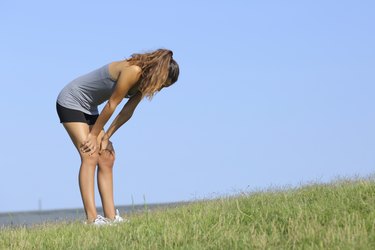
There are a few reasons why you might become dizzy during a workout. Dizziness during exercise can be harmless, or it can be an indicator of something more serious. If you are experiencing dizziness when working out, it's essential to know the signs of possible health risks.
Tip
Feeling dizzy when working out can be harmless or it could be a sign of something more serious. Not eating or drinking enough and having an electrolyte imbalance can cause dizziness.
Video of the Day
Dizziness or lightheadedness can be a signal that you are pushing yourself too hard during a workout. It can also indicate that you have low blood sugar or a nutrient deficiency. You may feel like you are losing your balance and experience visual disturbances. Recognizing the signs of possible danger can help you know when to stop exercising and seek help.
Video of the Day
Dizziness During Exercise: Danger Signs
According to the U.S. National Library of Medicine, there are two types of dizziness: lightheadedness and vertigo. If you feel that you might pass out or faint, that is lightheadedness. If the world around you looks like it's spinning or moving strangely, you are experiencing vertigo.
The U.S. National Library of Medicine explains that in general, dizziness that's not necessarily related to exercise is not usually severe and can go away by itself or is easily treatable. Lightheadedness can occur for the following reasons: Your blood pressure drops quickly, after sitting or lying down and standing up quickly or if you have lost fluids and are dehydrated. Dehydration can be due to illness or intense exercise leading to fluid loss through sweat.
During exercise, symptoms such as chest pain, shortness of breath, lightheadedness and joint pain can be warning signs of something more serious, according to Harvard Health Publishing. Don't push through exercise when you experience these symptoms. Stop immediately and seek medical advice.
It is also essential to be aware of more serious conditions that can cause lightheadedness, with or without exercise as a stimulus. As the U.S. National Library of Medicine notes, these include heart problems, stroke, internal bleeding or shock leading to an extreme drop in blood pressure. Look out for symptoms such as chest pain, racing heart, confused speech or vision disturbances, which may signal that you're experiencing a life-threatening emergency.
It is imperative to contact emergency medical services if you have a head injury, fever over 101 degrees Fahrenheit, headache or stiff neck, seizure, pain in your chest or an irregular heart rate that feels like it's skipping beats, shortness of breath, weakness, the inability to move an arm or a leg, altered vision or speech, or fainting. Speak to a doctor if you faint during exercise as it may indicate a more serious issue.
You Could Have Electrolyte Imbalance
When the electrolytes in your body are too high or low, dizziness and lightheadedness can occur, according to Kaiser Permanente. This can result from losing too much fluid through sweat. Be sure to replace lost fluid and minerals if you are exercising in the heat, for long periods of time or at intense levels.
Watch out for warning signs of something more serious. If along with feeling dizzy when working out, you feel overly fatigued with muscle spasms or twitching, nausea, dizziness or lightheadedness that doesn't go away, stop exercising. Extreme warning signs include mental disturbances, irregular heart rate or seizure, says the U.S. National Library of Medicine. If you experience any of these symptoms, immediately call for emergency care.
Conditions such as diabetes or heart disease can put you at higher risk of having an electrolyte imbalance. If you are eating a very low-calorie diet or a restrictive diet, you may also experience electrolyte and mineral deficiencies and imbalances due to malnourishment, says Kaiser Permanente.
Be Sure to Fuel Properly
Very low energy diets can cause lightheadedness and dizziness, as well as fatigue and other adverse side effects, according to a September 2017 article published in Behavioral Sciences. Fuel yourself properly for your activity level with an appropriate amount of carbohydrates to prevent low blood sugar, which can also cause symptoms of dizziness.
How many calories per day you need depends on your activity level, as well as your age, sex, height, weight and whether or not you are injured, as well as your body composition. The 2015-2020 Dietary Guidelines for Americans recommend between 1,600 to 2,400 calories per day for adult women and 2,000 to 3,000 calories per day for a man, with the high range being for more active individuals.
However, depending on your activity levels, you may need more. You can use the calorie needs estimation calculator from the American Council on Exercise to get a more accurate picture of your needs.
- U.S. National Library of Medicine: "Dizziness"
- Kaiser Permanente: "Electrolyte Disturbances"
- Health.gov: "Dietary Guidelines for Americans, 2015-2020: Appendix 2. Estimated Calorie Needs per Day, by Age, Sex, and Physical Activity Level"
- Behavioral Sciences: "Strategies to Improve Adherence to Dietary Weight Loss Interventions in Research and Real-World Settings"
- American Council on Exercise: "Daily Caloric Needs Estimate Calculator"
- Harvard Health Publishing: "Safe Exercise: Know the Warning Signs of Pushing Too Hard"
Is this an emergency? If you are experiencing serious medical symptoms, please see the National Library of Medicine’s list of signs you need emergency medical attention or call 911.